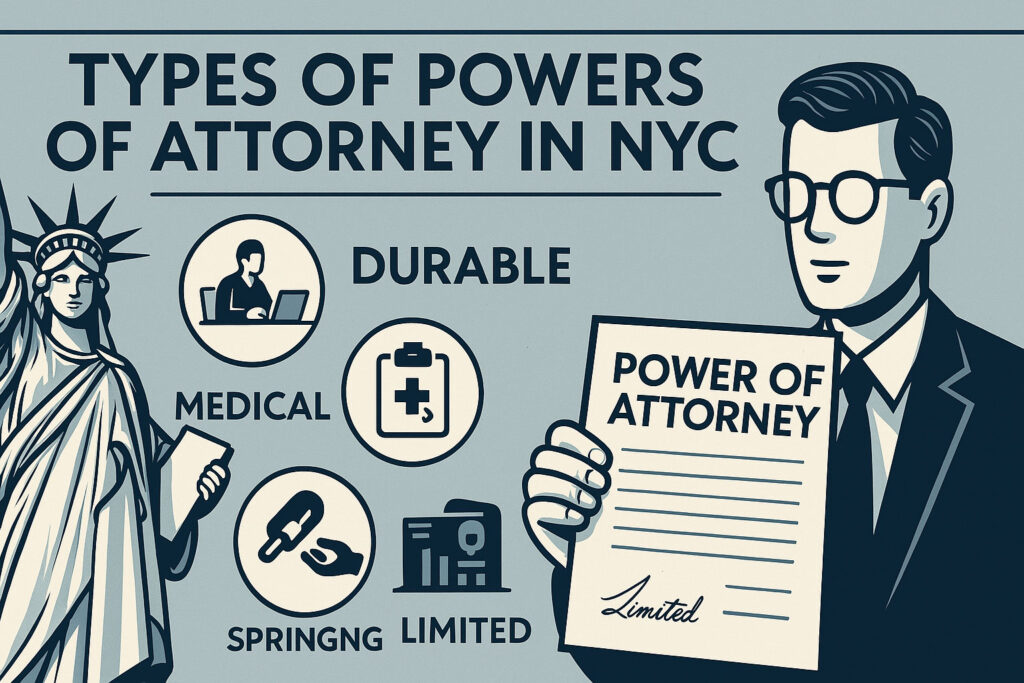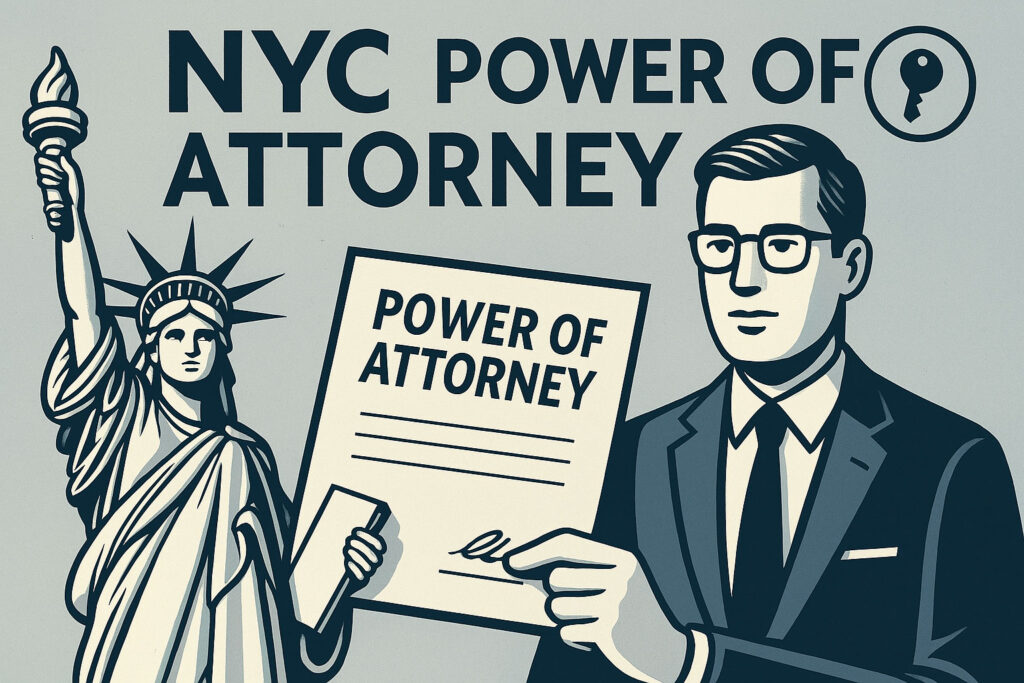NYC Power of Attorney: A Complete Guide to Protecting Your Future
In the bustling city of New York, planning for the unexpected is crucial. A Power of Attorney (POA) is a legal document that allows you to appoint someone you trust to act on your behalf in financial and/or medical matters if you become unable to do so yourself. Whether you’re a young professional, a business owner, or a senior citizen, understanding the importance of a POA and having the right documents in place can provide invaluable peace of mind. Navigating this may feel difficult, but it should not be a weight on your back. At Morgan Legal Group, we hope to provide peace and clarity for these moments.
This comprehensive guide will explore the different types of POAs available in New York City, the powers you can grant to your agent, the requirements for creating a valid POA, and the steps you can take to protect yourself from potential abuse. What will you gain as you read further?
Find protection and reliefIn simple terms, a Power of Attorney (POA) is a legal document that gives another person the authority to act on your behalf. These are not to be taken lightly! This may seem like a very limited purpose or role, but that is not often the case. With that power comes the great responsibility of all kinds! However, there are also certain things that Power of Attorney DOES NOT cover! Power of Attorney does not:
- Give legal access to a guardian!
- Override decisions for family care.
- Override what has been properly laid out.
This list is not exhaustive, so please prepare before jumping in! Reach out today to us and we’ll help you! Morgan Legal Group- Power of Attorney We will ensure you know these details!”

Types of Powers of Attorney in NYC
New York law recognizes several types of powers of attorney, each with its own specific purpose and scope of authority. The right type for your needs is critical, so how do you ensure you have chosen the correct method? Here are a few methods: Look at the differences! Ask yourself, “What are my needs?” Seek help!
To help with your search, we have this list!
- Durable Power of Attorney: A durable power of attorney remains in effect even if you become incapacitated. This is the most common type of POA used for estate planning purposes. The goal for a lot of people is that they want something durable.
- Non-Durable Power of Attorney: A non-durable power of attorney terminates if you become incapacitated. This type of POA is typically used for specific transactions or for a limited period.
- General Power of Attorney: A general power of attorney gives your agent broad authority to act on your behalf in all financial matters. This is like a blank check to your interests, so use caution!
- Limited Power of Attorney: A limited power of attorney gives your agent authority to act on your behalf only in specific matters, such as selling a piece of real estate or managing a particular bank account. People like to pick and choose what they want to serve the outcome best.
- **Healthcare Power of Attorney:** A healthcare power of attorney, also known as a healthcare proxy, gives your agent the authority to make medical decisions on your behalf if you are unable to do so yourself.
You must choose carefully, as the role you will place can impact greatly.
Powers You Can Grant to Your Agent
When creating a POA, you have the power to specify the exact powers you want to grant to your agent. Depending on your needs and preferences, these powers can be broad or limited. Depending on the option, you can control where to make the mark for your wishes. But what are these options?
Some common powers that are granted in POAs include:
Financial Powers:
This includes the authority to manage your bank accounts, pay your bills, make investments, and file taxes.
Real Estate Powers:
This includes the authority to buy, sell, or manage real estate on your behalf.
Healthcare Powers:
This includes the authority to make medical decisions on your behalf, access your medical records, and consent to or refuse medical treatment.
Legal Powers:
This includes the authority to represent you in legal matters and to hire attorneys on your behalf.
But with great power comes great responsibility, which is why this role cannot be taken lightly!
Requirements for Creating a Valid NYC Power of Attorney
To be legally valid in New York, a POA must meet certain requirements outlined in the General Obligations Law. It is not easy, but it also shouldn’t be impossible! How do you make sure that is taken care of? Follow the simple steps!
- Check out the rules and laws!
- Then, talk to an attorney
- Sign in all the appropriate areas!
To ensure that you follow a legal and ethical path, stick to the basic formula!
The key requirements are: You can refer to the resources at the end to do more research!
- Writing: The POA must be in writing and must be signed by you (the principal).
- Witnesses: The POA must be witnessed by two individuals who are at least 18 years old and who are not named as agents in the document. This is often overlooked but vital.
- Acknowledgment: Your signature must be acknowledged before a notary public or other authorized official.
- Statutory Form: The POA must be created using the New York Statutory Short Form Power of Attorney, or it must substantially conform to the language of the statutory form.
Protecting Yourself from Power of Attorney Abuse in NYC
While a POA can be a valuable tool for planning for the future, it’s also important to be aware of the potential for abuse. A dishonest or unscrupulous agent could use their authority to steal your assets or make decisions that are not in your best interest. Having legal power can make it difficult for people not to be trusted! Here are some useful tips to prevent these scenarios from happening!
Here are some steps you can take to protect yourself from POA abuse:
- Choose Your Agent Carefully: Select someone you trust implicitly and who has a proven track record of honesty and integrity. Think deeply and have people you have a good support system with.
- Limit the Agent’s Authority: Consider limiting the scope of authority you grant to your agent, only giving them the powers they need to manage your affairs.
- Require Accountings: Include a provision in the POA that requires your agent to provide regular accountings of their actions. Having a log of actions is a great way to manage the system.
- Monitor Your Finances: Regularly review your bank statements, credit card statements, and other financial records to ensure that your agent is not misusing your funds. This is not rude, it is best to make sure that all things are appropriate!
- Consult with an Attorney: Work with an experienced attorney who can advise you on how to protect yourself from POA abuse and what to do if you suspect that abuse has occurred. A skilled legal hand can assist with all of this.
It also means that there should be steps to take in how to react in case you see the signs! These steps must help protect your best interests at each point.
Frequently Asked Questions (FAQs) About Powers of Attorney in NYC
Here are some frequently asked questions about Powers of Attorney in New York City:
- Q: What is the difference between a Power of Attorney and a Healthcare Proxy? A: A Power of Attorney gives your agent authority to make financial decisions on your behalf, while a Healthcare Proxy gives your agent authority to make medical decisions on your behalf. Both serve a purpose!
- Q: Can I have more than one agent under a Power of Attorney? A: Yes, you can name co-agents or successor agents in your Power of Attorney. However, it’s important to consider whether this arrangement will work effectively for your situation. You have to follow what your gut tells you.
- Q: What happens if my agent misuses their authority? A: If your agent misuses their authority, you can revoke the Power of Attorney and take legal action to recover any losses. This is where those honest conversations from the get-go help!
- Q: Does a Power of Attorney expire? A: A Power of Attorney can be durable, meaning it remains in effect even if you become incapacitated, or it can be non-durable, meaning it terminates if you become incapacitated.
- Q: Where can I get a Power of Attorney form? A: The New York Statutory Short Form Power of Attorney can be found on the New York State Bar Association’s website or from an attorney.
Russel Morgan may be the person to call for any Power of Attorney Questions!
Finding the Right Estate Planning Attorney for Your Power of Attorney Needs
Choosing the right attorney to help you create a Power of Attorney is a crucial decision. Here are some factors to consider:
- Make sure you read your lawyer’s credentials!
- You have legal referrals!
- That you seek a consult with a law office!
With the best things said above, please explore the opportunities below and schedule a meeting today!
- Skilled With The Right Tools.
- Good Reputation.
- Open Communication.
You should check these qualities to have the most trust in these endeavors!
Taking the Next Step: Connect with Morgan Legal Group Today
A Power of Attorney is an essential tool for planning for the future and protecting your financial and medical wishes. For residents of New York City, working with an experienced estate planning attorney is a wise decision. At Morgan Legal Group, we are dedicated to providing personalized estate planning solutions to individuals and families throughout New York City and beyond. For example: This includes New York
What is offered in NYC
Our services also cross through all over the New York region too. There are just too many to account for! But to name a few:
If you are looking to go outside of the Big Apple, we are also within range: Ulster County. Check us out here! Google.
If you want to check out additional law resources, you can refer to NY Courts
Take the next step in your success and well-being. Reach out here today! Book Appointment Services
We can also assist you more directly, if you have more challenges! Here you can view our work in: elder abuse.









